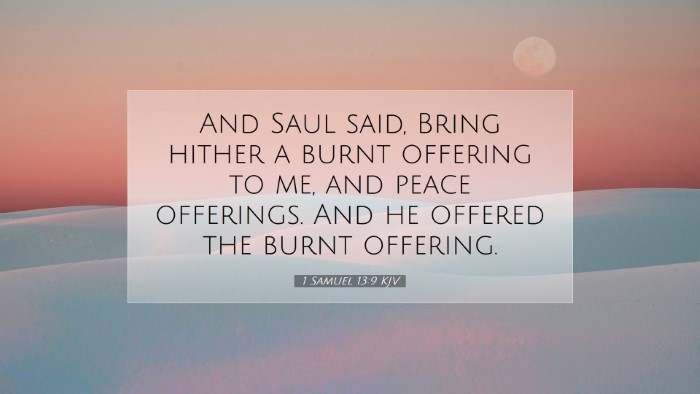Commentary on 1 Samuel 13:9
Verse Reference: 1 Samuel 13:9 - "So Saul said, 'Bring the burnt offering and the peace offerings here to me.' And he offered the burnt offering."
Contextual Overview
This verse occurs during a crucial moment in the history of Israel, specifically regarding Saul's kingship and the nation's military challenges. Saul, the first king of Israel, faces the threat of the Philistines, and the pressure mounts as his army begins to scatter. In a moment of panic and impatience, Saul takes it upon himself to offer sacrifices to the Lord, an act that under the Mosaic Law was restricted to the priesthood.
Theological Implications
The significance of Saul's actions extends beyond the mere act of offering sacrifices; it reflects deeper themes of obedience, authority, and faith.
- Disobedience to God's Command: As noted in various commentaries, Saul’s decision to perform priestly duties is a clear violation of divine order. The commentaries by Matthew Henry emphasize that such disobedience demonstrates a lack of faith in God’s timing and provision.
- Symbolism of Sacrifice: Albert Barnes notes that sacrifices symbolize devotion and the need for divine favor. Saul’s haste to offer a sacrifice highlights his misguided attempt to curry favor with God amidst military distress.
- Leadership and Responsibility: Adam Clarke points out that Saul's actions reflect the struggles of leadership; the pressure he faced led him to act out of fear rather than faith. This underscores the importance of trusting God during trials.
Commentary Insights
Matthew Henry's Commentary
Matthew Henry discusses the broader implications of Saul's behavior, indicating that his impatience stemmed from a lack of reliance on God’s plan. Henry articulates how Saul’s unauthorized actions not only jeopardize his relationship with God but also set a grievous precedent for subsequent kings of Israel. He stresses that God desires obedience over ritualistic practices.
Albert Barnes's Notes
Albert Barnes elaborates that Saul’s decision to offer the burnt offering signifies desperation rather than genuine devotion. He emphasizes that the act of offering sacrifices should have been coupled with true repentance and faith. Barnes warns that leaders who deviate from God’s prescription risk losing His favor and guidance.
Adam Clarke's Commentary
Adam Clarke provides insight into the cultural and historical background of sacrificial offerings. He notes the weight of Saul's actions as reflective of a critical moment where faith was tested. Clarke indicates that Saul’s choice to usurp priestly duties indicates a heart that was not fully aligned with God’s will, showcasing the fine line leaders tread between faith and folly.
Application for Today
The themes arising from 1 Samuel 13:9 resonate with contemporary believers and leaders alike. This passage serves as a cautionary tale illustrating the need for:
- Patience in Leadership: In moments of crisis, it is vital to wait upon the Lord, trusting His timing and methods.
- Respect for God’s Order: Understanding the distinction between roles in ministry helps maintain the integrity of worship and the functioning of the church.
- Dependence on God: Both personal and corporate faith requires reliance on God rather than human strategies to achieve divine purposes.
Conclusion
1 Samuel 13:9 serves as a powerful reminder of the consequences of impatience and disobedience in leadership. The commentaries from Matthew Henry, Albert Barnes, and Adam Clarke collectively provide profound insights into Saul's actions and illuminate lessons applicable to modern-day believers. As we reflect on this passage, may we cultivate a heart that honors God’s command, eagerly waits for His guidance, and truly understands the significance of our practices in worship.


